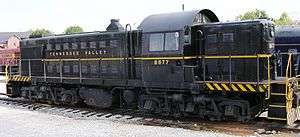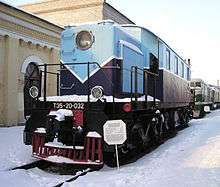| ALCO RSD-1 |
|---|
 |
| Type and origin |
|---|
| Power type |
Diesel-electric |
|---|
| Model |
RSD-1 |
|---|
| Build date |
November 1942 – May 1946 |
|---|
| Total produced |
150 |
|---|
|
|
|
| Performance figures |
|---|
| Maximum speed |
65 mph (105 km/h) |
|---|
| Power output |
1,000 hp (750 kW) |
|---|
| Tractive effort |
40,425 lbf (179,820 N) |
|---|
|
|
|

Former Soviet Railways Д
а20-09 (D
A20-09) on exhibit at the railway museum in former Varshavsky terminal --
Saint Petersburg, Russia. Originally built by ALCO as a model RSD-1 in 1944 and exported to the USSR.
The ALCO RSD-1 was a diesel-electric locomotive built by American Locomotive Company (ALCO). This model was a road switcher type rated at 1,000 horsepower (750 kW) and rode on three-axle trucks, having a C-C wheel arrangement. It was often used in much the same manner as its four-axle counterpart, the ALCO RS-1, though the six-motor design allowed better tractive effort at lower speeds, as well as a lower weight-per-axle. It was developed to meet the need to supply the Soviet Union over the Trans-Iranian Railway starting in mid 1943. On the other hand, due to the traction generator and appurtenant control apparatus being sized for four axles and yet having two additional powered axles, it had poorer performance at higher speeds.[1]
Variations
There were three different specifications issued that covered the RSD-1 model; E1645 and E1646 were for wartime production for the US Army, while E1647 was a post-war order for the Mexican National Railways (Ferrocarriles Nacionales de México).
Soviet Union
Alco locos
Seventy of the RSD-1s were shipped overseas to the Soviet Union in early 1945 during World War II, as part of the Allied war effort. They were classed there as the Soviet Railways ДA20 (DA20) class, also known just as ДА after 1947 (D for Diesel, A for Alco and 20 for axle load in tons).[1] They were used in ordinary line service rather than shunting, especially in southern parts of the Soviet Union (Turkmenistan), where water for steam locomotives was scarce.[1] These locomotives were also used on the Trans-Iranian Railway. The Soviets subsequently kept many of the RSD-1s after the war, adopting the design to form the basis of their own line of diesel locomotives TE1, TEM1 and TEM2. Two RSD-1s were sunk en route to the Soviet Union when the ship they were on was torpedoed by a German U-boat (ДA20-41 and ДA20-50) and 68 were received.[1] They entered service from March 1945, and some were still in service in the 1980s.[1] The DA20-27 hauled Stalin's train to Potsdam Conference, and its positive evaluation was among reasons to copy the design[1] (the Soviet Union built only 51 diesel locomotives before the war, so it had not enough experience with designing).[2]
Soviet locos
The Soviet-built TE1 (ТЭ1), initially designed TE1-20, was a reverse engineered copy of the Alco product, adapted to metric system and Soviet norms.[3] They were almost identical, but locomotives after #TE1-20-122 had 1050 mm (41.34 inch), instead of 40 inch wheels (1016 mm).[3] The designation meant T - teplovoz (diesel engine), E - electric transmission, model 1, 20 ton axle load.[3] A production lasted from 1947 until 1950 and 300 were made (including 2 of TE5 class).[3] The TE2 (ТЭ2) utilized engine and electric components of TE1, but was as a twin-unit version, with a wagon-type body and utilized two-axle bogies.[4] The TE5 (ТЭ5) was a cold climate version of the TE1. The cab was extended for most of the locomotive to provide covered access to the engine and a boiler was added to keep the cab warm when the engine was not running.
[5] Only two (or five) TE5 were built, within TE1 series.[3]
US Army
The first 13 RS-1s were requisitioned by the US Army, returned to ALCO and rebuilt to RSD-1s #8000-8012 for use on the Trans Iranian Railroad. This effort was to supply the Soviet Union. See the RS-1 article for the identity of the first 13 RSD-1s.
Original owners
Specification E1645
| Railroad | Quantity | Road Numbers | Notes |
|---|
| United States Army | 13 | 8000–8012 |
Persian Gulf Command, Iran |
| United States Army | 44 | 8013–8056 | |
|
Specification E1646
| Railroad | Quantity | Road Numbers | Notes |
|---|
| United States Army | 30 | 8600–8629 | to Soviet Railways Да20-1 to Да20-30 |
| United States Army | 11 | 8630–8640 | lost in U-boat attack |
| United States Army | 8 | 8641–8648 | to Soviet Railways Да20-31 to Да20-38 |
| United States Army | 1 | 8649 | lost in U-boat attack |
| United States Army | 30 | 8650-8679 | |
| United States Army | 20 | 8680–8699 | to Soviet Railways Да20-39 to Да20-58 |
|
References
- Rakov, Vitaliy (1995). Lokomotivy otechestvennyh zheleznyh dorog 1845-1955 [Locomotives of domestic railways 1845-1955] (in Russian). Moscow. ISBN 5-277-00821-7.
External links
Another RSD-1 roster with build dates http://www.thedieselshop.us/Alco_RSD1.HTML
Rolling stock of former Soviet Union countries |
|---|
Steam
locomotives | |
|---|
Diesel
locomotives | | Freight | |
|---|
| Passenger | |
|---|
Shunting
Industrial |
- Оэл
- ВМЭ1
- ЧМЭ2
- ЧМЭ3 (ChME3)
- ЧМЭ5
- ТЭМ1
- ТЭМ2
- ТЭМ3
- ТЭМ4
- ТЭМ5
- ТЭМ6
- ТЭМ7
- ТЭМ9
- ТЭМ12
- ТЭМ15
- ТЭМ18
- ТЭМ21
- ТЭМ31
- ТЭМ-ТМХ
- ТЭМ103
- МГ1
- МГ2
- АМГ5
- ТГМ1
- ТГМ21
- ТГМ23
- ТГМ2
- ТГэ
- ТГК
- ТГК2
- ТГМ3
- ТГМ4
- ТГМ5
- ТГМ6
- ТГМ7
- ТГМ9
- ТГМ10
- ТГМ11
- ТГМ12
- ТГМ14
- ТГМ40
- АА
|
|---|
| Narrow gauge | |
|---|
|
|---|
Electric
locomotives | |
|---|
Multiple
units | | Metro | |
|---|
| Diesel | |
|---|
| Electric | |
|---|
| High speed | |
|---|
|
|---|
|



 RSD-1 returned to the US after serving in Alaska for many years, seen in 2011
RSD-1 returned to the US after serving in Alaska for many years, seen in 2011